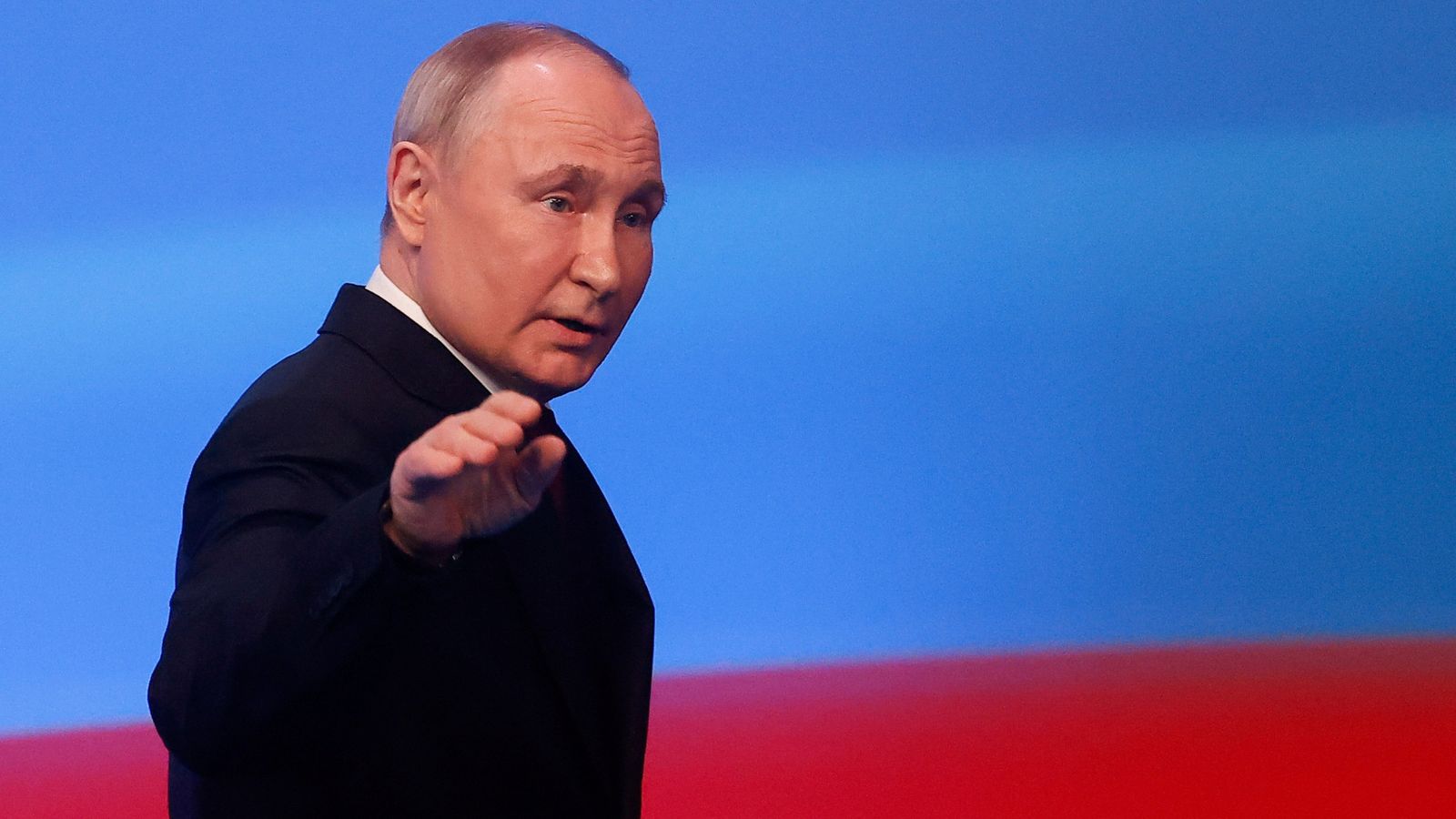The Russian president used his “victory” speech to say protests during the election had “no effect” and any “crimes” would be punished after the vote.
Vladimir Putin has claimed victory in an election he said showed the people had “trust” and “hope” in him.
Sunday was the last day of a presidential election that offered Russians no real alternatives to Mr Putin after he ruthlessly cracked down on dissent.
Early returns after the polls closed showed he is poised to extend his near 25-year rule until 2030, with some 87% of the vote after about 80% of precincts were counted, according to Russia’s Central Election Commission.
Ukraine war latest: Putin ‘supported’ Navalny prisoner swap
Mr Putin went on to say that protests during the election had “no effect” and any “crimes” would be punished after the vote.
He also said that he was informed of an idea to release his fiercest political foe, Alexei Navalny, from prison, days before the opposition leader’s death in an Arctic prison last month.
‘Noon against Putin’ protest had ‘no effect’
He said that he agreed to the idea, on condition that Mr Navalny did not return to Russia.
Mr Putin told a meeting of volunteers: “Of course, we have lots of tasks ahead. But I want to make it clear for everyone: When we were consolidated, no one has ever managed to frighten us, to suppress our will and our self-conscience.
“They failed in the past and they will fail in the future.”
Explainer:
How Russians protested the election
He also said the presence of Western troops in Ukraine will “lead the world to the brink of World War Three” but did not think anyone was interested in such a scenario.
The election took place after a relentless crackdown on dissent – and amid attacks within Russia by Ukrainian missiles and drones, which have killed several people.
Mr Putin faced competition from only three token rivals and any public criticism of him or his war in Ukraine was stifled.
Cheers for Yulia Navalnaya at anti-Putin protest
Critics are either in jail or in exile. Beyond the fact that voters have virtually no choice, independent monitoring of the election was extremely limited.
Mr Navalny’s associates had urged those unhappy with Mr Putin or the war to protest by coming to the polls at noon on Sunday – and lines outside a number of polling stations both inside Russia and at its embassies around the world appeared to swell at that time.
Analysis:
Vladimir Putin will predictably win the Russian election, but it still matters
Among those heeding call was Yulia Navalnaya, Mr Navalny’s widow, who joined a long line at the Russian Embassy in Berlin as some in the crowd applauded and chanted her name.
Read more:
Shapps abandoned Ukraine port visit over missile threat
Finland to block asylum seekers arriving from Russia
She spent more than five hours in the line and told reporters after casting her vote that she wrote her late husband’s name on the ballot.
Asked whether she had a message for Mr Putin, Ms Navalnaya replied: “Please stop asking for messages from me or from somebody for Mr Putin. There could be no negotiations and nothing with Mr Putin, because he’s a killer, he’s a gangster.”
The OVD-Info group that monitors political arrests said 80 people were arrested in 20 cities across Russia on Sunday.
British Foreign Secretary David Cameron wrote on X: “The polls have closed in Russia, following the illegal holding of elections on Ukrainian territory, a lack of choice for voters and no independent OSCE monitoring.
“This is not what free and fair elections look like.”

Emily Foster is a globe-trotting journalist based in the UK. Her articles offer readers a global perspective on international events, exploring complex geopolitical issues and providing a nuanced view of the world’s most pressing challenges.








